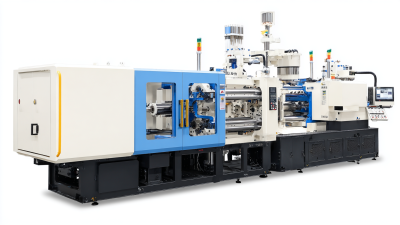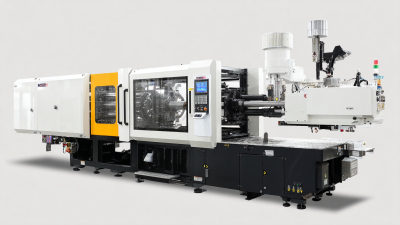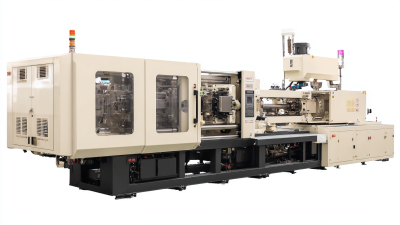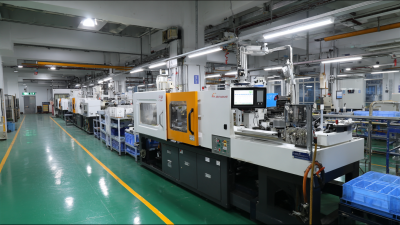How to Choose the Right Moulding Plastic Machine for Your Manufacturing Needs
The global plastic manufacturing industry is witnessing significant growth, with an estimated market size projected to reach $750 billion by 2025, according to a recent market analysis by Grand View Research. As the demand for high-quality plastic components continues to rise across various sectors, selecting the right moulding plastic machine has become a critical decision for manufacturers. The effectiveness and efficiency of these machines not only impact production output but also influence the quality of the end product. With advancements in technology, a myriad of options are available, ranging from injection moulding to blow moulding machines, each tailored to specific manufacturing needs. Therefore, understanding the key factors that contribute to the optimal selection of a moulding plastic machine is essential for businesses aiming to enhance their operational capabilities and competitive edge in this ever-evolving industry.

Factors to Consider When Selecting Moulding Plastic Machines for Your Business
When selecting a moulding plastic machine for your business, several key factors must be considered to ensure you make the right investment. First, assess the type of material you will be using, as different machines are designed to handle various plastic types. For instance, thermoplastics may require specific injection molding machines that operate at different temperatures compared to thermosetting plastics. Understanding the material properties can significantly influence the machine's performance and the quality of the final product.
Another important factor is the production volume you anticipate. High-volume production may necessitate a machine with faster cycle times and greater efficiency, while smaller operations might prioritize versatility and ease of use. Additionally, consider the machine's energy consumption and maintenance requirements; these can impact long-term operational costs. Lastly, evaluate the machine's compatibility with your current production processes and future scalability to ensure it meets your growing business needs. By carefully analyzing these factors, you can choose a moulding plastic machine that aligns well with your manufacturing goals and budget.
Understanding Different Types of Moulding Plastic Machines and Their Applications
 When it comes to selecting the right moulding plastic machine, understanding the various types and their applications is crucial for optimizing manufacturing processes. There are primarily two methods of moulding: injection moulding and blow moulding. Injection moulding is a highly efficient process typically used for producing complex parts with high precision. According to industry reports, the global injection moulding market is expected to reach $370 billion by 2026, highlighting its continued relevance in sectors such as automotive, electronics, and consumer goods.
When it comes to selecting the right moulding plastic machine, understanding the various types and their applications is crucial for optimizing manufacturing processes. There are primarily two methods of moulding: injection moulding and blow moulding. Injection moulding is a highly efficient process typically used for producing complex parts with high precision. According to industry reports, the global injection moulding market is expected to reach $370 billion by 2026, highlighting its continued relevance in sectors such as automotive, electronics, and consumer goods.
On the other hand, blow moulding is favored for producing hollow objects like bottles and containers. This method allows for thinner walls and is more cost-effective for large production runs. A report by Grand View Research indicates that the blow moulding market was valued at approximately $40 billion in 2021, with expectations of steady growth as demand for sustainable packaging solutions rises. Understanding these methods and their applications can guide manufacturers in choosing the right machine tailored to specific production requirements, ultimately enhancing efficiency and product quality.
Key Features to Look for in a High-Performance Moulding Plastic Machine
When selecting a moulding plastic machine, the key features you should prioritize include precision, efficiency, and adaptability. Precision is vital in ensuring that the finished products meet the exact specifications required by your manufacturing standards. Advanced machines are equipped with updated control systems that allow for fine-tuning during the moulding process, thus reducing waste and enhancing product quality.
Efficiency plays a crucial role in maintaining a competitive edge. Look for machines that offer quick cycle times and energy-saving technologies. These features not only optimize production rates but also help in reducing operational costs. Moreover, consider the adaptability of the machine; it should be versatile enough to handle different types of materials and accommodate various mould designs without extensive modifications. This flexibility is essential as it allows manufacturers to respond swiftly to market changes and evolving product demands. Investing in a machine with these core attributes will ultimately lead to improved output and sustained growth in your manufacturing operations.
Manufacturing Needs: Key Features of Moulding Plastic Machines
Cost Analysis: Budgeting for Your Moulding Plastic Machine Investment
When considering the investment in a moulding plastic machine, a thorough cost analysis is essential for budgeting effectively. This process involves more than just the initial purchase price; factors like maintenance, energy consumption, and operational costs can significantly impact your total expenditure. It's crucial to evaluate the long-term financial implications of the machine, rather than focusing solely on upfront costs.
**Tip:** Start by researching different models and their specifications. Create a comparison chart to visualize the differences in price, energy efficiency, and maintenance requirements among machines. This will help you identify which options align best with your manufacturing needs and budget.
Another key aspect of budgeting is factoring in potential hidden costs. Shipping, installation, and staff training are often overlooked but can add substantial amounts to your overall investment. Additionally, consider the availability of spare parts and support services, as these can also impact cost efficiency down the line.
**Tip:** Engage with manufacturers or distributors for detailed cost breakdowns, including warranty options and after-sales support. This proactive approach can save you money and headaches in the future, ensuring that your moulding plastic machine functions optimally for years to come.

Tips for Evaluating the Reliability and Support of Moulding Plastic Machine Suppliers
When selecting a moulding plastic machine for your manufacturing needs, evaluating the reliability and support of potential suppliers is crucial. A reliable supplier should have a proven track record in the industry, backed by customer testimonials and case studies. Researching their history of performance can give you insights into the quality of their machines and the level of service they provide post-purchase. Look for suppliers who are transparent about their production processes and can demonstrate their machines' capabilities in real-world applications.
In addition to assessing the supplier's reliability, consider the support they offer. A comprehensive after-sales service, including installation, training, and troubleshooting, is essential for minimizing downtime and maximizing productivity. Suppliers that provide accessible technical support and prompt maintenance services can make a significant difference in your operations. Ensure that the supplier you choose offers a strong warranty and readily available spare parts, as this will not only enhance your production efficiency but also build a strong partnership that supports your long-term growth in the manufacturing sector.
| Feature | Importance Rating (1-5) | Comments |
|---|---|---|
| Machine Capacity | 5 | Must meet production volume needs. |
| Energy Efficiency | 4 | Reduces operational costs over time. |
| Technical Support | 5 | Essential for minimizing downtime. |
| Ease of Use | 4 | User-friendly controls enhance productivity. |
| Spare Parts Availability | 5 | Quick access to parts reduces repair times. |
| Material Compatibility | 4 | Supports a range of materials for flexibility. |
| Warranty & Service Terms | 4 | Consider inclusive service packages. |
Related Posts
-

Global Quality Revolution How Chinese Moulding Plastic Machines Capture International Markets
-

How to Choose the Best Home Plastic Injection Molding Machine for Your DIY Projects
-

Evaluating the Best Large Injection Molding Machines for Global Buyers in 2025 Industry Trends and Insights
-

Exploring Innovative Alternatives to Plastic Injection Machines for Modern Manufacturing
